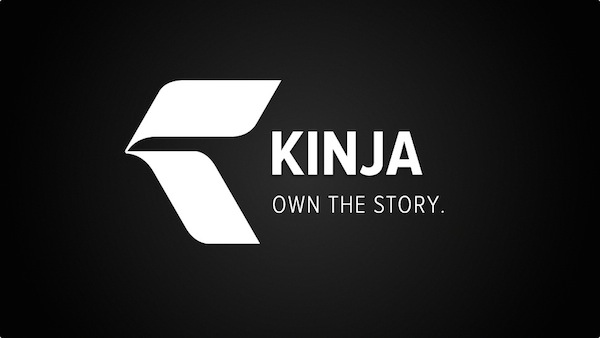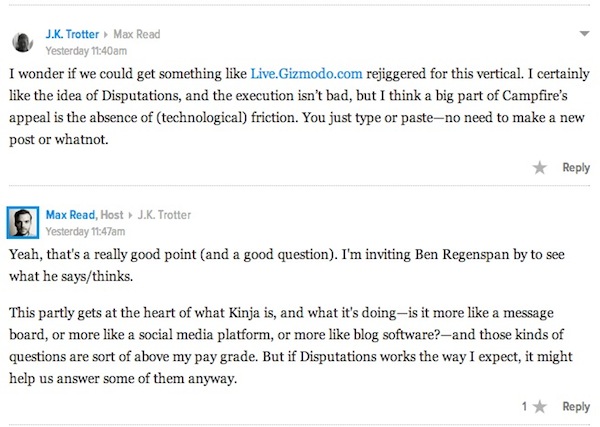
Once upon a time, I visited the Gawker offices in Manhattan, and I was struck first and foremost by the silence. It was very, very quiet there. An occasional outburst of laughter, yes, but for the most part everyone was mutely typing away. Why? Because they were talking to each other via chat.
We recently published a story about the growing popularity of Slack in newsrooms, a new chat client that allows for file sharing, constant collaboration, and custom emoji, among other things. Excitement over Slack has highlighted just how much time newsroom employees spend instant messaging each other — pitching stories, sounding out ideas, sharing links, making jokes.Yesterday, Gawker editor-in-chief Max Read announced that his employees were spending a little too much time on chat (in their case, an app called Campfire). Or at least too much time being smart and funny on chat:
Starting today I am going to start kicking people out of Campfire for 24-hour periods if they use it to argue about food, cities, music, movies, news, politics, or anything else that is smart (or at least funny) enough that it should appear on our website.
If you have stuff you want to talk about that doesn’t have a direct editorial function, take it here, to Disputations.
Not all Gawker employees were thrilled about the idea of surfacing their internal chatter, and a few took to Kinja and the new Disputations vertical to complain, as is their wont.

That Read would want to take the private parts of Taylor Berman’s intelligence and character and turn them into monetizable content is, well, very Gawkeresque, if you consider Nick Denton’s founding principle for the media company — to make journalists’ after-hours barroom conversations public.
But it’s also an interesting play toward making transparency attractive. Dennis Mersereau, recently arrived at Gawker’s new weather vertical The Vane, neatly sums up the feeling those on the periphery of the Manhattan bloggerati might experience:

So, if the idea is that the audience will find value in office chit-chat, what kind of #learnings have been surfaced from the inner sanctum of cool so far? Well, for one thing, Gawker is no longer holding regular Monday morning editorial meetings.

In addition, Sam Biddle is not a fan of the publishing industry, J.K. Trotter is not a fan of Business Insider or David Carr, and, for reasons that are beyond my understanding, many of the Gawker staffers are fans of Chopt.
But of all the targets for Gawker’s trademark derision, none is taking as many hits as BuzzFeed. In particular, the focus is on a recent post by Justin Carissimo, which details the responses Carissimo received after spamming the BuzzFeed editorial list with the news that his apartment had no hot water. The post has received over 3.5 million views.
“This post is so bad that it literally makes me suicidal,” writes Sam Biddle on Disputations. “I can’t stand corniness of this magnitude.” Then later, from a Tom Scocca post titled “3.1 Million People (and Counting) Are Idiots”:
Here it is, Peak Garbage-Sharing Internet (for now). If you click this link, you will be stupider. If you share the link, the entire world will be stupider. It is like an old-fashioned bad-luck chain letter, only the bad luck consists in reading the letter itself. If you break the chain, you will feel fantastic.
BuzzFeed has done a number of posts along these lines of late, culling content from their jokey internal chats to produce posts like “What The State You Live In Says About You”, “What Girls’ First Names Say About Them”, “What Guys’ First Names Say About Them,” and “What Your Drink Of Choice Says About You.” (Only two of which got over a million views, for what it’s worth.)
But however loathsome Gawkerites may find this type of casual-inclusivity-as-premium-product, Disputations is basically the same thing, only with the trademark Gawker snark in place of the trademark BuzzFeed smarm — as they’ll be the first to admit.

(The Gawker posts I’ve mentioned so far hover between views in the few hundreds to around 5,000 for the announcement.)
The feeling of being made privy to what should be a behind-the-scenes conversation is undoubtedly titillating, but inside jokes are not enticing to everyone on the Internet, as NPR’s David Folkenflik pointed out yesterday just a few hours after Disputations launched.
Read them both, but BuzzFeed & Gawker today have become fractal-like inside joke machines. Thought that's what Twitter was for.
— David Folkenflik (@davidfolkenflik) June 30, 2014
(It’s almost enough to drive Anthony De Rosa to carpentry.)
For some, Disputations only exacerbates the feeling of being left out of a joke:
Ummm, Gawkerites, what in the fuckity fuck is this? Translate? http://t.co/LbbXcf2miJ
— Clio (@Clio_On_Kinja) June 30, 2014
In response, Read argues that it’s all about how you reach Gawker. If you visit the homepage, the headlines are legible and relevant to just about anyone — take “The NYPD Is Scrubbing New York Clean of Subway Dancers” or “Manhattan Real Estate Explained: Very Expensive.” “Gawker feels (to me) less like an inside joke than it ever has,” Read wrote in a tweet to Folkenflik.
But the deeper you go into Kinja comments, clicking and clicking to make them unfold, the more likely you are to encounter a rogue Rich Juzwiak comment or a Hamilton Nolan quip, which could be alienating for the stray reader who doesn’t know how they got there. Ultimately, what Disputations could provide if strictly executed is a reference point of sorts — a way to understand how inside jokes are born.
Ideally, Gawker is as insidery as you want it to be — the more you read, the more you engage with the content, the more you learn to mimic the voice, the more the platform will reward you, the cooler you will be. That’s the logic that’s reflected in their Recruits program, which rewards low-paid interns who are able to draw traffic by rising out of the commentariat via Kinja.
Indeed, Gawker staff agrees that Disputations could be the experiment that reveals Kinja’s full potential for creating the message board-cum-publication that Nick Denton has always dreamed of:

Denton himself hit at the idea back in March, when during a ask-Nick-anything session he revealed Kinja’s primary target audience:
